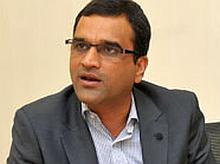 | « Back to article | Print this article |
Madhusudan Kela, chief investment strategist, Reliance Capital, has been a die-hard bull for over a decade. But he has turned cautious now, as one can see from his sector picks - pharmaceuticals and information technology.
But he has turned cautious now, as one can see from his sector picks - pharmaceuticals and information technology.
He tells Joydeep Ghosh that the government needs to take steps so that household savings are directed towards financial assets instead of real estate and gold. Edited excerpts:
The growth in corporate profits is at just 4.36 per cent for 2,500 companies this quarter. Is the worst over?
The fundamentals will take some more time to improve. The sentiment has improved after the Finance Minister took series of positive steps like, increasing the fuel prices and so on.
It’s because of these positive sentiments that the government was able to raise Rs 21,000 crore (Rs 210 billion) as divestments.
But for this sentiment to sustain and get translated into improvement in real macroeconomic/earnings data may take some time. It’s a good 12 months away. The markets are on a protracted U curve.
Also, all this will only happen, if there are no catastrophes globally. Else the fundamental recovery will get delayed.
Though I remain optimistic on India story from the longer term perspective, what makes me cautious in the near term is the fact that there is little confidence amid businessmen. Instead of chasing growth/expansion, everyone is talking about business consolidation.
The idea is to complete existing projects rather than starting new ones. Earnings recovery therefore is likely to be gradual and not sharp.
In such a situation, what impetus can the government provide through the Budget?
It can do a lot. The way in which diesel prices are being raised in small doses - it’s something they could have done three years back and no one would have complained.
The government seems to be in line with the fiscal consolidation roadmap, but it needs to be thoughtful while cutting down on expenditure so that it does not affect aggregate demand.
Private investments are in doldrums. As a priority, it should incentivise investments by taking required steps within the budget and beyond it.
However, in my view, the biggest challenge today is to increase our savings and ensure they are deployed in productive financial assets.
In FY08, our savings was near 37 per cent, which is down to 30 per cent in FY13 - a drop of 7 per cent on Rs 100 lakh crore (Rs 100 trillion) base. In other words, savings are down by Rs 7 lakh crore (Rs 7 trillion) or around $130 billion.
All efforts should be made to revive the savings. If one can garner or direct those savings, many of our problems can be resolved.
Not only has gross savings come down; the sharpest fall has been in the household savings. Within household savings the composition has tilted towards physical savings.
Out of this 30 per cent, roughly 30 percent is going into real estate and 10 percent is going into gold.
While Indian policymakers have acknowledged this as a problem, Government has to come up with solid measures to direct these into financial savings, which could then be mobilized into productive investments.
For instance, if there is a tax-free infrastructure bonds that can collect say, Rs 50,000 crore (Rs 500 billion). Then, a part of your infrastructure financing problems could be addressed.
For instance, if the government gives 8-9 per cent on tax-free bonds, the pre-tax rate of return is 11-12 per cent. If gold has to compete with these bonds, the prices of gold will have to be Rs 60,000 in the next five to six years which looks difficult if not impossible.
Gold did well in the last few years because the global environment was unstable. But over a large number of years, the picture is completely different.
In dollar terms, despite a decade-long bull run, gold has returned only 3.2 per cent (CAGR) since 1980.
Today, the savings have to be directed towards financial instruments - fixed deposits, bonds or equities - and be moved out of gold and real estate.
I think it is highly unlikely that gold will beat equities and fixed income in the next five-ten years.
So, how does one tackle the gold problem?
You have to do something out of the box. One suggestion is to make other financial instruments attractive. For instance, the short-term capital gains tax can be removed.
They could put conditions that it will be only for companies in the BSE 100 or 500 so that it is not misused.
Similarly, the definition of short term can be at least one month and so on to reduce speculation. The loss of tax revenues will be marginal, but this will be a big sentiment booster.
Things improved in the USA, when tax-saving schemes entered the market. Similarly, another bold step which Government can take is to increase the Rs 100,000 deduction limit to Rs 300,000.
This is in line with DTC draft recommendation. These steps can go a long way in bolstering the investor’s sentiment.
But the government stands to lose tax revenues…
Yes, through this move there could be some loss to the exchequer, but increased investor’s